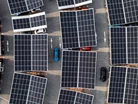UN World Environment Day: Will e-mobility take precedence?

Climate change is the aim of the game and e-mobility is one of the most critical conversations to be had when the word ‘sustainability’ arises.
The current challenge of decarbonisation is one that concerns every car maker, components suppliers, and energy provider aligned with the goal to reduce emissions to zero—a major milestone to reach is the abolishment of new internal combustion engine (ICE) sales by 2030 in most countries.
This next United Nations (UN) World Environment Day will likely be a contributing factor to organisational commitment as businesses lay out their plans to action climate change from their own perspectives and influence the electric vehicle (EV) supply chain at the same time.
The response is seemingly universal as the energy landscape changes, EVs become more prominent on the roads, charging at service stations, and battery technology and renewable energy receive much more attention and investment than ever before. The CEO of a Tesla-backed organisation, Zola Electric shares his thoughts on the matter and how the company is tackling pollutant substances to achieve the goals aligned with the UN.
“This World Environment Day, we are reminded of the urgency of mitigating climate change and the cruciality of halving greenhouse gas emissions by 2030 to limit environmental damage, while committing to energy equality across the globe,” says Bill Lenihan, CEO of Zola Electric.
“With worldwide energy demand growth being driven significantly by emerging markets, this will only be possible through the development of affordable, reliable clean energy networks for all.”
Pioneering new enterprise technology, backing clean energy
In light of news that renewable energy investment is exceeding that of oil, the company is proud to see a surge in sustainable technologies.
“This World Environment Day, we are reminded of the urgency of mitigating climate change and the cruciality of halving greenhouse gas emissions by 2030 to limit environmental damage, while committing to energy equality across the globe. With worldwide energy demand growth being driven significantly by emerging markets, this will only be possible through the development of affordable, reliable clean energy networks for all,” says Lenihan.
The Tesla-backed business is a major contributor through enterprise energy technology, supporting business functions to solve critical issues, such as energy access and equality, while delivering power in a sustainable way.
“At ZOLA, we are proud to be pioneering an enterprise technology platform combining hardware and software in a distributed architecture that fills the white space in the clean energy landscape. Our systems help to replace expensive, polluting energy sources - such as diesel, or kerosene - and can work with any energy source – driving forward the energy transition while delivering energy access and affordability where it is most needed,” Lenihan says.
“Three billion people, and hundreds of millions of schools, clinics, and businesses currently lack access to reliable, affordable, and clean energy – and we are committed to developing solutions that not only address energy inequality, but do so without compromising on sustainability. Sustainable solutions must be accessible by all – irrespective of location – in order to truly make an impact and address climate change."
E-mobility in the climate conversation
Of course energy transition is the main factor in driving a decarbonised power supply chain, but this goes hand-in-hand with the automotive transition. Without clean energy, e-mobility cannot become sustainable mobility.
Driving a reliance on alternative power sources—which are now becoming the norm—will lead to a faster adoption of electrified vehicles through energy availability. Energy providers and charge point installers are to collaborate to enable clean energy across the entire supply chain.

